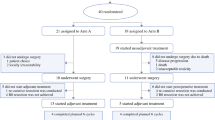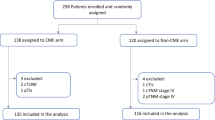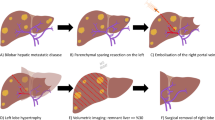Abstract
Background
The National Comprehensive Cancer Network (NCCN) guidelines for colon cancer recently added the following footnote regarding the therapeutic strategy for peritoneal metastases: “If R0 resection can be achieved, surgical resection of isolated peritoneal disease may be considered at experienced centers.” This study investigated the efficacy of R0 resection of peritoneal metastasis from colorectal cancer without cytoreductive surgery or hyperthermic intraperitoneal chemotherapy (HIPEC).
Methods
This retrospective cohort study was conducted at a single-institution tertiary care cancer center. Among 496 consecutive M1c colorectal cancer patients, R0 resection was achieved for 94 patients (19%). The subjects were 78 consecutive patients with colorectal cancer and simultaneous peritoneal metastasis but no other distant metastases who underwent R0 resection at the National Cancer Center Hospital from 1971 to 2016 (16% of all M1c patients). Overall survival (OS) was investigated, and clinicopathologic variables were analyzed for prognostic significance.
Results
No perioperative mortality was noted. The 3-year OS rate was 45%, and the 5-year OS rate was 28.7%. The median survival time was 33.4 months. Notably, 17 patients survived for more than 5 years, and 9 of these patients did not receive any chemotherapy. Multivariate analysis showed cancer location in the colon and harvesting of 12 or more lymph nodes to be independent factors associated with a better prognosis.
Conclusions
From the perspective of long-term outcomes and no perioperative mortality, R0 resection of peritoneal metastasis from colorectal cancer, without complete peritonectomy or HIPEC, appeared to be an acceptable therapeutic option for some patients with peritoneal metastasis.


Similar content being viewed by others
References
Watanabe T, Muro K, Ajioka Y, et al. Japanese Society for Cancer of the Colon and Rectum (JSCCR) guidelines 2016 for the treatment of colorectal cancer. Int J Clin Oncol. 2017. doi:10.1007/s10147-017-1101-6.
Franko J, Shi Q, Meyers JP, et al. Prognosis of patients with peritoneal metastatic colorectal cancer given systemic therapy: an analysis of individual patient data from prospective randomised trials from the Analysis and Research in Cancers of the Digestive System (ARCAD) database. Lancet Oncol. 2016;17:1709–19.
UICC. TNM Classification of Malignant Tumours, 8th ed. Wiley: New York; 2017.
Sugarbaker PH, Ryan DP. Cytoreductive surgery plus hyperthermic perioperative chemotherapy to treat peritoneal metastases from colorectal cancer: standard of care or an experimental approach? Lancet Oncol. 2012;13:e362–9.
Benson AB III, Venook AP, Cederquist L, et al. Colon Cancer, version 1.2017, NCCN Clinical Practice Guidelines in Oncology. J Natl Compr Canc Netw. 2017;15:370–98.
Rectum JSfCotCa. Japanese Classification of Colorectal Carcinoma (8th ed). Kanehara & Co., Ltd: Tokyo, 2013.
Kobayashi H, Kotake K, Sugihara K; Study Group for Peritoneal Metastasis from Colorectal Cancer by the Japanese Society for Cancer of the C, Rectum. Enhancing the objectivity of the Japanese classification of peritoneal metastases from colorectal cancer. Jpn J Clin Oncol. 2014;44:898–902.
Elias D, Gilly F, Boutitie F, et al. Peritoneal colorectal carcinomatosis treated with surgery and perioperative intraperitoneal chemotherapy: retrospective analysis of 523 patients from a multicentric French study. J Clin Oncol. 2010;28:63–8.
Ihemelandu C, Sugarbaker PH. Management for peritoneal metastasis of colonic origin: role of cytoreductive surgery and perioperative intraperitoneal chemotherapy: a single institution’s experience during two decades. Ann Surg Oncol. 2017;244:898–905.
Elias D, Glehen O, Pocard M, et al. A comparative study of complete cytoreductive surgery plus intraperitoneal chemotherapy to treat peritoneal dissemination from colon, rectum, small bowel, and nonpseudomyxoma appendix. Ann Surg. 2010;251:896–901.
Morris EJ, Forman D, Thomas JD, et al. Surgical management and outcomes of colorectal cancer liver metastases. Br J Surg. 2010;97:1110–18.
Jones RP, Kokudo N, Folprecht G, et al. Colorectal liver metastases: a critical review of state of the art. Liver Cancer. 2016;6:66–71.
Noura S, Ohue M, Ito Y, et al. New staging system for colorectal cancer patients with synchronous peritoneal metastasis in accordance with the Japanese classification of colorectal carcinoma: a multi-institutional study. Dig Surg. 2016;33:66–73.
Kobayashi H, Kotake K, Sugihara K. Outcomes of surgery without HIPEC for synchronous peritoneal metastasis from colorectal cancer: data from a multi-center registry. Int J Clin Oncol. 2014;19:98–105.
Sato H, Maeda K, Kotake K, Sugihara K, Takahashi H. Factors affecting recurrence and prognosis after R0 resection for colorectal cancer with peritoneal metastasis. J Gastroenterol. 2016;51:465–72.
Ozawa H, Kotake K, Kobayashi H, Kobayashi H, Sugihara K. Prognostic factors for peritoneal carcinomatosis originating from colorectal cancer: an analysis of 921 patients from a multi-institutional database. Surg Today. 2014;44:1643–50.
Kobayashi H, Kotake K, Funahashi K, et al. Clinical benefit of surgery for stage IV colorectal cancer with synchronous peritoneal metastasis. J Gastroenterol. 2014;49:646–54.
Furuhata T, Okita K, Nishidate T, et al. Oncological benefit of primary tumor resection with high tie lymph node dissection in unresectable colorectal cancer with synchronous peritoneal metastasis: a propensity score analysis of data from a multi-institute database. Int J Clin Oncol. 2015;20:922–7.
Disclosures
There are no conflicts of interest.
Author information
Authors and Affiliations
Corresponding author
Rights and permissions
About this article
Cite this article
Shida, D., Tsukamoto, S., Ochiai, H. et al. Long-Term Outcomes After R0 Resection of Synchronous Peritoneal Metastasis from Colorectal Cancer Without Cytoreductive Surgery or Hyperthermic Intraperitoneal Chemotherapy. Ann Surg Oncol 25, 173–178 (2018). https://doi.org/10.1245/s10434-017-6133-7
Received:
Published:
Issue Date:
DOI: https://doi.org/10.1245/s10434-017-6133-7




